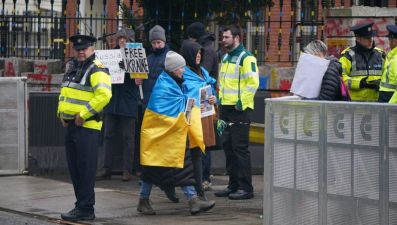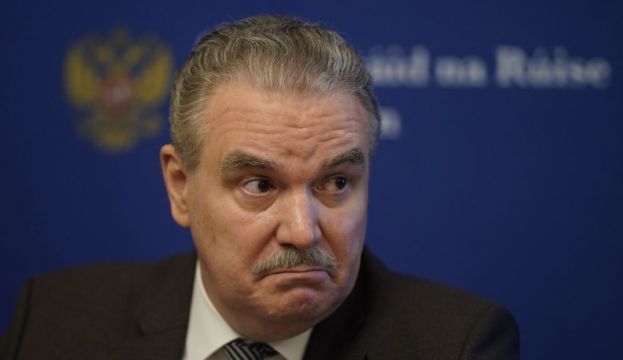Updated 5pm
Ireland has asked four Russian diplomats to leave the State because their activities “have not been in accordance with international standards of diplomatic behaviour”.
In a statement on Tuesday afternoon, Minister for Foreign Affairs Simon Coveney said his Department had summoned Russian Ambassador Yury Filatov to advise him that four senior officials had been asked to leave the country.
It follows security advice received by the Government on Monday.
The decision has been condemned by the Embassy of the Russian Federation in Ireland, which said the move “will not go unanswered.”
Statement just released @dfatirl pic.twitter.com/4nVvwT97CV
— Simon Coveney (@simoncoveney) March 29, 2022
Advertisement
Mr Coveney said: “This afternoon, the Department of Foreign Affairs summoned the Russian Ambassador to Iveagh House to advise him that four senior officials have been asked to leave the State.
“This is because their activities have not been in accordance with international standards of diplomatic behaviour. This action is being taken under Article 9 of the 1961 Vienna Convention on Diplomatic Relations.
“The Government continues to believe that diplomatic channels between Ireland and the Russian Federation should remain open.
“This is in the interests of our citizens as well as to ensure that we can continue to have a diplomatic channel of communication between Ireland and the Russian Federation in the future.
“This channel of communication has been very important in the context of conveying our strong views on the Russian Federation’s war against Ukraine, which we regard as a serious breach of international law.”
Security briefing
Taoiseach Micheál Martin said both he and Mr Coveney had received a security briefing on Monday.
He told the Dáil: “Under the 1961 Vienna Convention, four senior officials of the Russian Embassy have been asked to leave the state because their activities are not in accordance with international standards of diplomatic behaviour.
“I received security advice yesterday. I know the Minister for Foreign Affairs also received security advice.
“We met yesterday in relation to this with our national security team, and under Article 9 of the 1961 Vienna Convention we have taken these actions.
“We nonetheless do believe that diplomatic channels between the Russian Federation and the state should stay open.
“In the interests of us conveying our abhorrence of the war, maintaining diplomatic channels is a principle but also to protect Irish citizens in Russia.”
Article 9 of the Vienna Convention says that a state may at any time, and without having to explain its decision, notify a sending state that any member of the diplomatic staff of the mission is “persona non grata or that any other member of the staff of the mission is not acceptable”.
Ambassador
Sinn Féin President Mary Lou McDonald welcomed the move on Tuesday, saying the expulsion of the Russian Ambassador must follow.
"No country should be subject to the kind of military aggression faced by Ukraine, and the priority must be to end this invasion and to secure a Russian withdrawal from Ukrainian territory. To that end, we hope that peace talks in Istanbul will be successful," she said.
"In the interim, the Government must act in the strongest possible terms by expelling the Russian Ambassador - the humanitarian crisis unfolding before us demands action at that level."
Amid the war in Ukraine, protesters in Ireland have continued to call for the expulsion of Russian diplomats, including the Russian Ambassador to Ireland.

Government Ministers have defended the Ambassador's presence in the country, saying a breakdown of diplomatic relations must be avoided in order to support Irish citizens in Russia.
Mr Filatov previously told Russian TV that Ireland is “hostile to Russia and everything Russian,” accusing the country of being to the forefront of “anti-Russian events” in the European Union.
He said protesters had been “really aggressive” at the country’s embassy in Dublin and said some Russian children faced bullying in schools.
-Additional reporting by Press Association.







